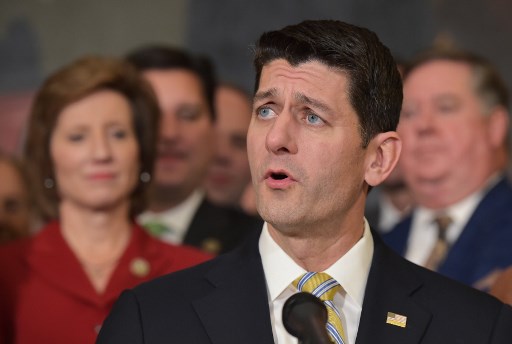
by Douglas Gillison
Agence France Presse
WASHINGTON, United States (AFP) — President Donald Trump and his Republican Party are in a party mood as they prepare to enact the most sweeping tax cuts in three decades — but analysts warn the country may wake up to a hangover.
The centerpiece of the $1.5 trillion legislation is a series of deep cuts for businesses that Republican leaders say will spur productivity and job creation and nudge an already humming US economy even higher.
“Enjoy and create many beautiful JOBS!” Trump tweeted Tuesday, hours before the House approved the package, bringing his administration to the cusp of its first policy triumph in Congress. The measure now heads to the Senate for a decisive vote expected late in the night.
But if history is any guide, some economists say, fiscal realities could soon force the tax plan’s proponents to eat their words.
In past decades, policymakers have reversed major cuts as deficits ballooned and economic windfalls failed to materialize.
The Trump administration estimates the cuts will pay for themselves with tax revenues rising as the economy grows, a hotly contested analysis, of which polls show the public remains skeptical.
Yet even outside economists who support the Republican plan do not claim its gains will balance out its costs.
“It won’t pay for itself but it would be worth the cost,” Glenn Hubbard, a former chief White House economist under president George W. Bush, told AFP.
Hubbard was one of nine Republican economists whose views were touted by Treasury Secretary Steven Mnuchin, in advancing the claim that the plan would increase GDP growth by 0.3 percent a year over a decade. This faced sharp pushback from Democratic economists, including former treasury secretary Larry Summers.
Major tax cuts enacted in 1981 and again in 2001-2003 ultimately suffered U-turns as policymakers faced a worsening fiscal outlook and politically unpalatable spending cuts.
In 1981, president Ronald Reagan’s administration oversaw steep tax cuts, including capital investment write-offs for companies, but agreed to reverse some of these the very next year, unnerved by shrinking tax receipts.
Still, deficits continued to balloon during the 1980s, with federal debt rising more than 60 percent to $2.6 trillion between 1981 and 1988 — switching the United States from the world’s largest international lender to its biggest debtor.
Nevertheless, that year presidential candidate George H.W. Bush uttered six fateful words he quickly came regret: “Read my lips: no new taxes.”
‘You’re going to regret it’
By 1990, with Bush in office, the White House retreated, deciding it had no choice but to accept some painful tax hikes, allowing the top marginal rates and the alternative minimum tax levied on many wealthier Americans to rise, just as the United States was about to slip into recession.
The move immediately opened up a chasm with Bush’s own party, sending his political team into disarray and exposing the president to ridicule from rival candidates. The climb-down likely cost Bush reelection in 1992.
“He probably lost his job because of it,” Matthew Gardner, a senior fellow at the Institute on Taxation and Economic Policy, told AFP.
“The lesson is pretty similar to the lesson that we should have learned in the ’80s and again in 2001: If you cut taxes without a flight path to sustainability, you’re likely to going to regret it.”
Tax cuts enacted under president George W. Bush in the early 2000s met a similar, although less straightforward, fate, according to Gardner.
Between 2001 and 2003, the administration and Congress lowered the top marginal tax rate to 35 percent from 39.6 percent, but after a protracted battle lawmakers allowed it to drift back up again to 39.6 percent in 2013 — where president Bill Clinton’s administration had left it in 1993.
“By late 2001, it was clear to many people that the budget surpluses that had prompted Bush to propose tax cuts as a candidate were really kind of illusory,” said Gardner.
The 2017 tax cuts, he added, will have obvious targets — such as certain privately-owned businesses that are currently taxed at individual rates — that Democrats could reverse should control of Congress swing back in their favor, he added.
“A lot of these genies can be put back in the bottle,” said Gardner.
But with the US federal debt at about $20 trillion, and the debt-to-GDP ratio its highest since World War II, economists of all stripes say a reckoning is in order. The question is where the spending cuts may come from.
As deficits balloon from their plan, Republicans are likely to call for cuts to social spending, exacerbating the effects of tax cuts that already favor the wealthy, according to Jared Bernstein, who served as economic advisor to former Vice President Joe Biden.
“How this plays out is going to have to be the result of future elections,” he told AFP.
© Agence France-Presse







